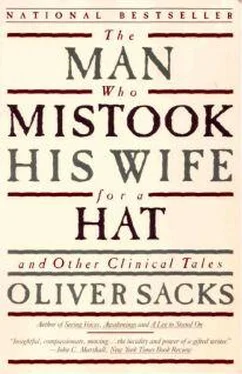Oliver Sacks - The man who mistook his wife for a hat
Здесь есть возможность читать онлайн «Oliver Sacks - The man who mistook his wife for a hat» весь текст электронной книги совершенно бесплатно (целиком полную версию без сокращений). В некоторых случаях можно слушать аудио, скачать через торрент в формате fb2 и присутствует краткое содержание. Жанр: Психология, на английском языке. Описание произведения, (предисловие) а так же отзывы посетителей доступны на портале библиотеки ЛибКат.
- Название:The man who mistook his wife for a hat
- Автор:
- Жанр:
- Год:неизвестен
- ISBN:нет данных
- Рейтинг книги:5 / 5. Голосов: 1
-
Избранное:Добавить в избранное
- Отзывы:
-
Ваша оценка:
- 100
- 1
- 2
- 3
- 4
- 5
The man who mistook his wife for a hat: краткое содержание, описание и аннотация
Предлагаем к чтению аннотацию, описание, краткое содержание или предисловие (зависит от того, что написал сам автор книги «The man who mistook his wife for a hat»). Если вы не нашли необходимую информацию о книге — напишите в комментариях, мы постараемся отыскать её.
The man who mistook his wife for a hat — читать онлайн бесплатно полную книгу (весь текст) целиком
Ниже представлен текст книги, разбитый по страницам. Система сохранения места последней прочитанной страницы, позволяет с удобством читать онлайн бесплатно книгу «The man who mistook his wife for a hat», без необходимости каждый раз заново искать на чём Вы остановились. Поставьте закладку, и сможете в любой момент перейти на страницу, на которой закончили чтение.
Интервал:
Закладка:
Around Christmas of that year, his brother understood, he had suddenly 'blown his top' and become deliriously excited and confused, and it was at this point he had been taken into Bellevue. During the next month, the excitement and delirium died down, but he was left with deep and bizarre memory lapses, or 'deficits,' to use the medical jargon. His brother had visited him at this time-they had not met for twenty years-and, to his horror, Jimmie not only failed to recognise him, but said, 'Stop joking! You're old enough to be my father. My brother's a young man, just going through accountancy school.'
When I received this information, I was more perplexed still: why did Jimmie not remember his later years in the navy, why did he not recall and organise his memories until 1970? I had not heard then that such patients might have a retrograde amnesia (see Postscript). 'I wonder, increasingly,' I wrote at this time, 'whether there is not an element of hysterical or fugal amnesia-whether he is not in flight from something too awful to recall', and I suggested he be seen by our psychiatrist. Her report was searching and detailed-the examination had included a sodium amytal test, calculated to 'release' any memories which might be repressed.
She also attempted to hypnotize Jimmie, in the hope of eliciting memories repressed by hysteria-this tends to work well in cases of hysterical amnesia. But it failed because Jimmie could not be hypnotized, not because of any 'resistance,' but because of his extreme amnesia, which caused him to lose track of what the hypnotist was saying. (Dr M. Homonoff, who worked on the amnesia ward at the Boston Veterans Administration hospital, tells me of similar experiences-and of his feeling that this is absolutely characteristic of patients with Korsakov's, as opposed to patients with hysterical amnesia.)
'I have no feeling or evidence,' the psychiatrist wrote, 'of any hysterical or "put-on" deficit. He lacks both the means and the motive to make a facade. His memory deficits are organic and permanent and incorrigible, though it is puzzling they should go back so long.' Since, she felt, he was 'unconcerned . . . manifested no special anxiety . . . constituted no management problem,' there was nothing she could offer, or any therapeutic 'entrance' or 'lever' she could see.
At this point, persuaded that this was, indeed, 'pure' Korsakov's, uncomplicated by other factors, emotional or organic, I wrote to Luria and asked his opinion. He spoke in his reply of his patient Bel,* whose amnesia had retroactively eradicated ten years. He said he saw no reason why such a retrograde amnesia should not thrust backward decades, or almost a whole lifetime. 'I can only wait for the final amnesia,' Buriuel writes, 'the one that can erase an entire life.' But Jimmies amnesia, for whatever reason, had erased memory and time back to 1945-roughly-and then stopped. Occasionally, he would recall something much later, but the recall was fragmentary and dislocated in time. Once, seeing the word 'satellite' in a newspaper headline, he said offhandedly that he'd been involved in a project of satellite tracking while on the ship Chesapeake Bay, a memory fragment coming from the early or mid-Sixties. But, for all practical purposes, his cut-off point was during the mid- (or late) Forties, and anything subsequently re-
*See A.R. Luria, The Neuropsychology of Memory (1976), pp. 250-2.
trieved was fragmentary, unconnected. I his was the case in 1975, and it is still the case now, nine years later.
What could we do? What should we do? There are no prescriptions,' Luria wrote, 'in a case like this. Do whatever your ingenuity and your heart suggest. There is little or no hope of any recovery in his memory. But a man does not consist of memory alone. He has feeling, will, sensibilities, moral being-matters of which neuropsychology cannot speak. And it is here, beyond the realm of an impersonal psychology, that you may find ways to touch him, and change him. And the circumstances of your work especially allow this, for you work in a Home, which is like a little world, quite different from the clinics and institutions where I work. Neuropsychological!}', there is little or nothing you can do; but in the realm of the Individual, there may be much you can do.'
Luria mentioned his patient Kur as manifesting a rare self-awareness, in which hopelessness was mixed with an odd equanimity. 'I have no memory of the present,' Kur would say. 'I do not know what I have just done or from where I have just come … I can recall my past very well, but I have no memory of my present.' When asked whether he had ever seen the person testing him, he said, 'I cannot say yes or no, I can neither affirm nor deny that I have seen you.' This was sometimes the case with Jimmie; and, like Kur, who stayed many months in the same hospital, Jimmie began to form 'a sense of familiarity'; he slowly learned his way around the home-the whereabouts of the dining room, his own room, the elevators, the stairs, and in some sense recognised some of the staff, although he confused them, and perhaps had to do so, with people from the past. He soon became fond of the nursing sister in the Home; he recognised her voice, her footfalls, immediately, but would always say that she had been a fellow pupil at his high school, and was greatly surprised when I addressed her as 'Sister'.
'Gee!' he exclaimed, 'the damnedest things happen. I'd never have guessed you'd become a religious, Sister!'
Since he's been at our Home-that is, since early 1975-Jimmie has never been able to identify anyone in it consistently. The
only person he truly recognises is his brother, whenever he visits from Oregon. These meetings are deeply emotional and moving to observe-the only truly emotional meetings Jimmie has. He loves his brother, he recognises him, but he cannot understand why he looks so old: 'Guess some people age fast,' he says. Actually his brother looks much younger than his age, and has the sort of face and build that change little with the years. These are true meetings, Jimmie's only connection of past and present, yet they do nothing to provide any sense of history or continuity. If anything they emphasise-at least to his brother, and to others who see them together-that Jimmie still lives, is fossilised, in the past.
All of us, at first, had high hopes of helping Jimmie-he was so personable, so likable, so quick and intelligent, it was difficult to believe that he might be beyond help. But none of us had ever encountered, even imagined, such a power of amnesia, the possibility of a pit into which everything, every experience, every event, would fathomlessly drop, a bottomless memory-hole that would engulf the whole world.
I suggested, when I first saw him, that he should keep a diary, and be encouraged to keep notes every day of his experiences, his feelings, thoughts, memories, reflections. These attempts were foiled, at first, by his continually losing the diary: it had to be attached to him-somehow. But this too failed to work: he dutifully kept a brief daily notebook but could not recognise his earlier entries in it. He does recognise his own writing, and style, and is always astounded to find that he wrote something the day before.
Astounded-and indifferent-for he was a man who, in effect, had no 'day before'. His entries remained unconnected and un-connecting and had no power to provide any sense of time or continuity. Moreover, they were trivial-'Eggs for breakfast', 'Watched ballgame on TV-and never touched the depths. But were there depths in this unmemoried man, depths of an abiding feeling and thinking, or had he been reduced to a sort of Humean drivel, a mere succession of unrelated impressions and events?
Jimmie both was and wasn't aware of this deep, tragic loss in himself, loss of himself. (If a man has lost a leg or an eye, he knows he has lost a leg or an eye; but if he has lost a self-
Читать дальшеИнтервал:
Закладка:
Похожие книги на «The man who mistook his wife for a hat»
Представляем Вашему вниманию похожие книги на «The man who mistook his wife for a hat» списком для выбора. Мы отобрали схожую по названию и смыслу литературу в надежде предоставить читателям больше вариантов отыскать новые, интересные, ещё непрочитанные произведения.
Обсуждение, отзывы о книге «The man who mistook his wife for a hat» и просто собственные мнения читателей. Оставьте ваши комментарии, напишите, что Вы думаете о произведении, его смысле или главных героях. Укажите что конкретно понравилось, а что нет, и почему Вы так считаете.












